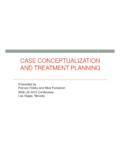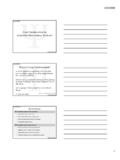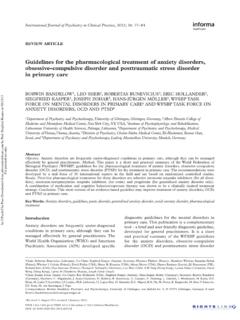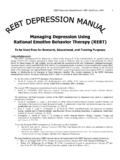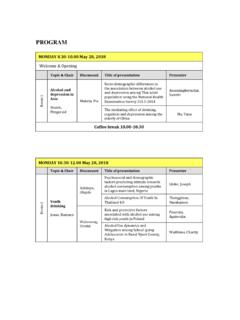Transcription of Cognitive Behavioural Therapy Supervision Recommended …
1 Behavioural and Cognitive Psychotherapy, 2006, 34, 413 420 Printed in the United Kingdom Behavioural Therapy Supervision : Recommended PracticeWerner M. PretoriusConsultant Psychiatrist, Perth, the absence of good quality evidence for the effectiveness of specific aspectsor formats of Cognitive Behavioural Therapy (CBT) Supervision , it is necessary to considerwhat is Recommended as good quality CBT Supervision . This review of the literature aims toprovide an overview of the Recommended practice of CBT Supervision by considering generalprinciples and goals of CBT Supervision ; the format of individual Supervision sessions; thecourse and stages of CBT Supervision ; attending to supervisees cognitions and affects; theimportance of the supervisory relationship as well as the recording and rating of therapysessions. This could provide a framework for setting standards to aspire to and stimulatefurther research in this field. Conforming to such practice would be an important step towardquality assurance in CBT : Supervision , Cognitive Behavioural generally agreed that a complex topic like psychotherapy cannot be learned through lecturesor independent study alone, and that supervised practise is an essential part of psychotherapytraining.
2 All accredited CBT training courses include or require Supervision . The requirementfor quality assurance in health care provision and training continues to grow in government White Paper,The New NHS: Modern, Dependable(DoH, 1997), formalizedquality assurance in the NHS as a statutory duty and another White Paper,Clinical Governancein the New NHS(DoH, 1999), identified clinical Supervision as an important mechanism tosupport and develop plays an essential role in quality control of all psychotherapies (includingCBT) during initial training and throughout therapists careers. It is not sufficient toprovide Supervision , without consideration of what constitutes good practice and currentbest evidence in the field. It is essential to assure the quality of Supervision itself in orderto train and maintain competent therapists who help their patients understand and overcometheir psychological difficulties. This review focuses specifically on aspects unique to CBTsupervision rather than addressing all aspects of health-professional Supervision in all requests to Werner M.
3 Pretorius, Consultant Psychiatrist, 8 St Leonard s Bank, Perth PH2 8EB, : 2006 British Association for Behavioural and Cognitive Psychotherapies414W. M. PretoriusMethodVarious electronic databases (Journals at OVID; MEDLINE, 1966 2004; PsychINFO, 1974 2004; EMBASE, 1980 2004; CINAHL, 1982 2004 and EBM Reviews, 1991 2004) weresearched. Search terms includedcognitive, behavior, Therapy and Supervision . Due to limitedsources, the search was widened to include terms likecounselling, training, teaching andeducation. Next, the references of all the useful sources, especially review articles and chaptersin textbooks, were studied and articles from less well-known publications found. Indexes ofseveral Cognitive and/or Behavioural Therapy journals were scanned. By writing to someprominent authors, further useful recommendations were of findingsThe literature reviewed is organized under the following headings: General principles andgoals of CBT Supervision ; Format of individual CBT Supervision sessions; Course and stagesof CBT Supervision ; Attending to the supervisee s cognitions and affects in CBT Supervision ;Importance of the relationship in CBT Supervision ; Recording and rating Therapy sessions inCBT principles and goals of CBT supervisionThe primary goal of CBT Supervision is to help the therapist adopt the philosophy of CBTas the basic approach for changing clients cognitions, emotions and behaviours to facilitateimprovement or recovery.
4 A secondary goal is to teach the therapist specific skills or combining the principles outlined by Newman (1998), Padesky (1996) and Rosenbaumand Ronen (1998), many similarities and differences between CBT treatment and supervisionemerge. Both CBT and its Supervision are systematic, goal-directed, structured, time-limited,collaborative, person-focused, confidential and active, with clear boundaries and a power-imbalance that requires to be managed ethically. The emphasis of both CBT and its supervisionis on mutual trust, openness, practice, experience, facilitation of change, building on existingstrengths, building conceptualization skills, developing more complex and balanced meaning-systems , application of new skills in natural environments, empowering the subject with self-change skills, using objective measures as well as actively eliciting and responding to Supervision has different goals, content of sessions, parameters for termination (generallycontinuing longer) and more flexibility in the evolution of the relationship, compared withtherapy.
5 In CBT Supervision , unlike Therapy , there is usually shared responsibility to a thirdparty, multiple supervisors may improve the outcome and the subject s personal problems tendto be addressed only when they interfere with the Therapy being a general rule, according to Perris (1993), CBT Supervision tends to follow a relativelydidactic model, with the focus more often being on theoretical and technical aspects orthe practical conduct of Therapy . The schema-focused model of Supervision advocated byGreenwald and Young (1998) bridges CBT and depth-oriented approaches and includesdevelopmental, interpersonal, and experiential elements. Schema focused Therapy principlesprovide a method for organizing case information about how clients operate and it is valuablein case conceptualization , developing a strategy, implementing interventions, resolvingdifficulties and understanding the role of the supervisee s own schema in the Therapy supervision415 The format of individual CBT Supervision sessionsMajor contributors in this area, Liese and Beck (1997) as well as Liese and Alford (1998),suggest the following structure for each CBT Supervision session: checking in; setting theagenda; bridging from the previous Supervision session; enquiring about previously supervisedcases; reviewing homework (reading, case conceptualization or experiments); prioritizing ofagenda items; discussing an individual (recorded) case ; using direct instruction and guideddiscovery; using standardized Supervision instruments; assigning new relevant homework.
6 Summarizing and eliciting feedback from the significant part of the Supervision session will be dedicated to the discussion of anindividual (recorded) case . Schmidt (1979) suggests the following format for this discussion:the therapist presents a difficult issue; theoretical hypotheses about its meaning are discussed;the therapist s emotive responses (especially anger, boredom, frustration, guilt and anxiety)to the issue are considered; and, finally, therapeutic approaches are discussed. With regard todirect instruction, Liese and Beck (1997) identified the following learning goals: diagnosisof problems; associated Cognitive models; Cognitive case conceptualization ; basic counsellingskills; structuring Therapy ; Cognitive techniques and Behavioural about Schema-Focused Therapy , Greenwald and Young (1998) suggest that anagenda be set for every Supervision session. Depending on the needs of the supervisee, theyoffer seven types of help: case conceptualization ; case strategizing; case implementation;resolving technical case problems; working on Therapy relationship issues; providing supportand personal help for the supervisee; discussing general conceptual and treatment , Twaddle and Freeston (2003) identified and described four interacting levels tobe considered as part of a conceptual framework in CBT Supervision .
7 The first level,primaryinputs, includes the context within which Supervision occurs, what is brought to Supervision ,the client s impact on Supervision and the selectivity with which the supervisee reports second level,parameters, outlines the characteristics, structure and development of thesupervisory project. The third level,dynamic focus, includes the changing focus on caseconceptualization, technique, and the therapeutic relationship. The fourth level,learningprocess, is framed within a model of experiential learning, with the stages through whichsupervision should proceed to achieve new knowledge, skill and survey of UK Cognitive Behavioural psychotherapists (Townend, Iannetta and Freeston,2002) confirms that 16 topics were discussed during Supervision , in order of frequency: case formulation; Cognitive analysis; Cognitive interventions; Behavioural interventions; threesystems analysis; functional analysis; application of techniques; emotional responsibility;goal setting; therapeutic bond; client safety; homework; ethical issues; evaluation methods;therapist safety; and exclusion course and stages of CBT supervisionIn Table 1, Padesky (1996) combines the different methods (columns) and foci (rows) as asupervision options grid.
8 Liese and Beck (1997), Padesky (1996), Perris (1994) and Schmidt(1979) suggest that the focus of Supervision for trainee therapists includes the beliefs theybring to the new Therapy situation and involves, first, making these self-statements explicitand then replacing them with more sensible or balanced beliefs. Gradually, the focus shiftsto mastering CBT methods, clinical processes, and case conceptualization skills to a deeper416W. M. PretoriusTable 1 Supervision options gridCase-discussionVideo/audio/liveobser vationRoleplay/demonstrationSupervisorco -therapyPeerco-therapyMastery of CBT methodsCase conceptualizationClient-therapist relationshipTherapist reactionsSupervisory processand deeper level. Supervision of intermediate therapists continues to focus on these areas,with additional attention being given to the client-therapist relationship. With experiencedtherapists the focus may be on the therapist or on the process of Supervision .
9 Most authorsrecommend individual Supervision for at least 1 hour on a weekly basis. Dobson andShaw (1988, 1993) as well as Shaw and Wilson-Smith (1988) recommend that beginningtherapists should start practising techniques with easier cases. Dobson and Shaw (1988,1993) warned us that therapists sometimes develop a preference for certain techniques andneglect others. Supervisors should aim to promote flexibility and consideration of to supervisees cognitions and affects in CBT supervisionJust as it is essential for therapists to conceptualize their patients, it is for CBT supervisors toconceptualize their supervisees and to explore Cognitive schema. Therapists personal issuesas well as problems that may develop between the supervisee and the supervisor in supervisionshould be addressed when they interfere with Therapy (Greenwald and Young, 1998; Liese andAlford, 1998; Liese and Beck, 1997). The approach Recommended by Schmidt (1979) focusesprimarily on the Cognitive activity of the supervisee and aims to produce a clinician who canrespond in a relatively anxiety-free way, to develop hypotheses about clients problematiccognitions, and to choose and test appropriate techniques to alter dysfunctional beliefs of trainee therapists include: I must show the supervisorhow perfect I am at Therapy , I must make the right decision, or something terrible willhappen and I must always love doing Therapy to be a good therapist.
10 Yogev (1982) pointsout that early interventions by the supervisor should aim to make the therapist aware ofsuch dysfunctional expectations that are a likely source of anxiety. Common misconceptionsregarding CBT include beliefs that it focuses only on immediate symptom reduction, whileignoring personality reorganization; that it is superficial and mechanistic; that it ignores earlyexperiences; that it neglects interpersonal factors; that it sees the therapeutic relationship asirrelevant; that it does not address the motivation for maintaining symptoms and that it does notview emotions as important. Liese and Beck (1997) recommend challenging and correctingsuch misconceptions to Perris (1993), supervisees emotions are usually dealt with in a straightforwardmanner when it interferes with Therapy , without intruding into supervisees personal life orencouraging regression. Reilly (2000) places more emphasis on emotion as a primary variableCBT supervision417in the CBT model of Therapy and Supervision .


